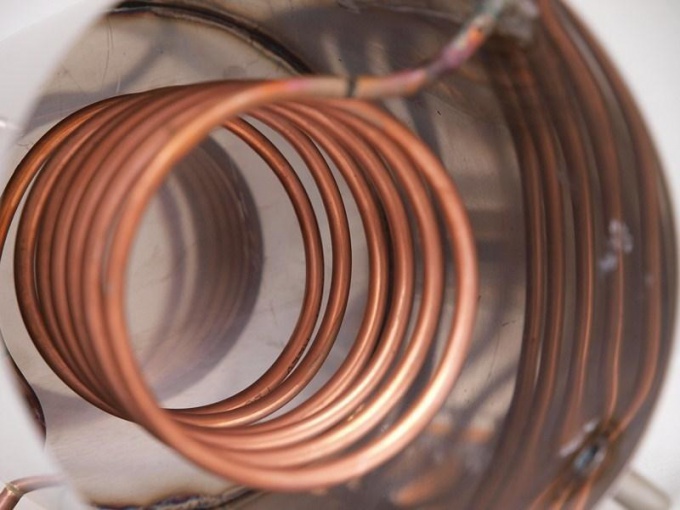The question of how to make a coil for moonshine should be considered in great detail. The material should be accessible to the handling, practical to use and necessarily inert - do not react with alcohol and its compounds. Also of great importance is the conductivity of the material, which directly affects the cooling rate of hot alcohol vapors. The choice can supply several kinds of materials, each of which has its advantages and disadvantages.
The most popular material for the manufacture of the coil moonshine is copper. It has high conductivity and is a very soft metal that easily bends. To minimize the copper tubes in the coil it is not necessary to pre-heat, unless the bending radius is not less than five nominal pipe diameters of the tube. On the other hand, such coils are not chemically neutral, while the copper and does not react with alcohol. Upon contact with oxygen on the surface of the copper tube is a thin patina of copper oxide, which inevitably enters the product of the distillation, though in very small doses.
Corrosion-resistant steel allows to obtain more pure final product, but it is more difficult to process. If the coil is of a softer metal can be bent, that is, bare hands, for processing stainless tube, you will need a gas burner, a pipe Bender or a special radial pattern. In addition, the coils of stainless steel are the most severe.
Glass as a material for the coil moonshine still is used less often, although ensures the absolute purity of the alcohol after distillation. Curving the glass in a special glass-blowing workshop, or in a curved tube will necessarily places the local stresses, leading to spontaneous destruction of the coil, even without mechanical or thermal effects. In addition, glass has the significant drawback to the connection of the coil with other elements of the apparatus: it is impossible to cut a thread or set tight the fastening strap.
A good alternative when choosing the material for cooler moonshine still pipe may be used for the installation of heating systems of "warm floor". The main advantage of this material is its cheapness and ease of handling, although it should be done with extreme caution. Nylon and polyethylene tubing are considered to be chemically neutral, do not come in contact with most known solvents. The main drawback of these tubes is high elasticity, which the coil is bad form, so it is fixed to the frame, often of wire.
Copper tube
The most popular material for the manufacture of the coil moonshine is copper. It has high conductivity and is a very soft metal that easily bends. To minimize the copper tubes in the coil it is not necessary to pre-heat, unless the bending radius is not less than five nominal pipe diameters of the tube. On the other hand, such coils are not chemically neutral, while the copper and does not react with alcohol. Upon contact with oxygen on the surface of the copper tube is a thin patina of copper oxide, which inevitably enters the product of the distillation, though in very small doses.
Stainless steel
Corrosion-resistant steel allows to obtain more pure final product, but it is more difficult to process. If the coil is of a softer metal can be bent, that is, bare hands, for processing stainless tube, you will need a gas burner, a pipe Bender or a special radial pattern. In addition, the coils of stainless steel are the most severe.
A coil of glass
Glass as a material for the coil moonshine still is used less often, although ensures the absolute purity of the alcohol after distillation. Curving the glass in a special glass-blowing workshop, or in a curved tube will necessarily places the local stresses, leading to spontaneous destruction of the coil, even without mechanical or thermal effects. In addition, glass has the significant drawback to the connection of the coil with other elements of the apparatus: it is impossible to cut a thread or set tight the fastening strap.
Nylon or plastic pipe
A good alternative when choosing the material for cooler moonshine still pipe may be used for the installation of heating systems of "warm floor". The main advantage of this material is its cheapness and ease of handling, although it should be done with extreme caution. Nylon and polyethylene tubing are considered to be chemically neutral, do not come in contact with most known solvents. The main drawback of these tubes is high elasticity, which the coil is bad form, so it is fixed to the frame, often of wire.

